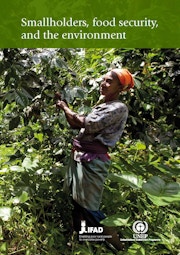
Smallholders, food security, and the environment
There are 1.4 billion poor people living on less than US$1.25 a day. One billion of them live in rural areas where agriculture is their main source of livelihood. The ‘green revolution’ in agriculture that swept large parts of the developing world during the 1960s and 1970s dramatically increased agricultural productivity and reduced poverty. Many of the productivity gains accrued to smallholder farmers, supported through research and extension services. However, those achievements came with environmental externalities, leaving soils degraded and groundwater depleted, undermining the very resource base that made the revolution possible. Moreover, two decades of underinvestment in agriculture, coupled with growing competition for land and water, rising input prices and climate change, have left smallholders more vulnerable and less able to escape poverty.
Yet poverty and environmental degradation need not be an inevitable outcome of modern development. At a time when there is renewed focus on agriculture in the context of sustainable development, there is a need and an opportunity to enhance the role that smallholders play in food production and natural resource stewardship.
This report, commissioned by IFAD and the United Nations Environment Programme, aims to improve understanding among policymakers and practitioners – together with those influencing and making decisions in relevant business sectors – of the relationships between smallholders, food security and the environment. It leads to the conclusion that, with targeted support, smallholder farmers can transform the rural landscape and unleash a new and sustainable agricultural revolution.
Publish your content with EB Publishing
It's about who you reach. Get your news, events, jobs and thought leadership seen by those who matter to you.







